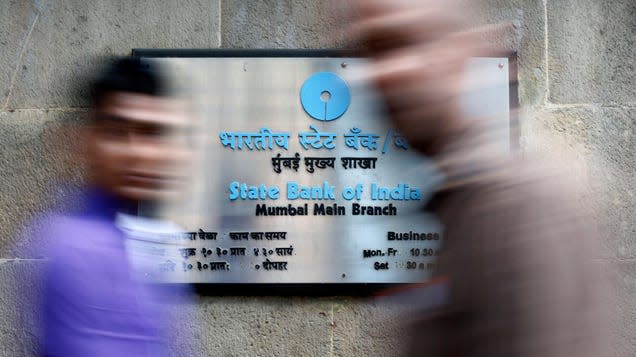India's top bank has cut oil and gas lending—but isn't turning down risky projects

The State Bank of India (SBI) is among several global lenders to have poured billions of dollars into fossil fuel firms amid clarion calls to combat climate change.
Together, behemoths like JP Morgan Chase, Bank of America, Barclays, and BNP Paribas, along with SBI, have lent $5.5 trillion to such companies since the adoption of the Paris Agreement, according to a report compiled last month by a coalition of environmental groups.
Read more
The Paris Agreement, signed by 196 members of the United Nations Framework Convention on Climate Change in 2016, called upon global banks to set and publicly disclose their long-term and intermediate targets to reduce global emissions.
Yet, in 2022 alone, they lent $673 billion to the industry.
In 2022, however, overall funding activity turned slow: JP Morgan Chase, for instance, cut down funding to fossil fuel companies by 42% over 2021. Citi (28%), Wells Fargo (25%), and Mitsubishi (12%), too, have cut back. Funds disbursal by SBI, India’s only lender listed in the report, also stood at a five-year-low of a little over $1 billion.
Notably, though, 59 of the 60 banks surveyed by the Fossil Fuel Finance Report 2023, did not yet have robust policies to ensure that global warming remains less than 1.5°C , as required under the Paris Agreement.
In any case, the report said, “Fossil fuel financing plateaued in 2020, rebounded in 2021, and levelled out again in 2022 owing to unusual geopolitical and economic conditions, not shifts in bank policy.”
SBI’s funding to oil and gas companies
Between 2016 and 2022, the public sector bank financed new fossil fuel expansion projects worth $9.49 billion. In 2016, the largest share of its funding went to Hindustan Petroleum Corporation’s Rajasthan Refinery at $4 billion; in 2022, it went to NTPC at $200 million, the report said.
Climate risks are only going to intensify as India is keen on expanding commercial coal mining.
By 2025-26, the country aims to export coal after meeting its own needs. This will require opening new mines and expanding the capacity of existing ones, according to Amrit Lal Meena, India’s coal secretary. “The coal ministry has clear plans till 2047,” Meena told Moneycontrol last week.
All this firmly puts Indian banks, which are financing many of the expansion projects, at centre stage.
Not surprisingly, a survey of 34 banks by think-tank Climate Risk Horizons (pdf) concluded last year that India’s banking system is unprepared for the financial impact of climate change.
SBI, particularly, only has a target for long-term carbon neutrality by 2030. “It does not include an implementation plan...It also does not have an exclusion/screening list for prohibited activities,” the think tank report said.
Things aren’t very different at the global level either.
No policy on excluding risky projects
Over the past two years, several international banking giants have adopted net zero commitments as their key approach to tackling the climate crisis.
The devil is, as usual, lurking where it always does—in the details.
The Fossil Fuel Finance Report concludes that the banks’ targets are too low, or leave controversial portfolios such as LNG, pipelines, and other infrastructure, unaddressed. Most of their targets are limited to oil, gas, and thermal coal. Moreover, nearly all such targets are applicable to only lending, excluding bonds and equity underwriting.
Only seven of the 60 banks surveyed include both lending and underwriting when more than a third of overall financing is done through underwriting, the report said.
“The truth is that more and more businesses are making net zero commitments, but benchmarks and criteria are often dubious or murky,” UN secretary-general António Guterres said at the World Economic Forum earlier this year.
Huge profits have helped, not strict lending policies
In 2022, banks’ financing in the global fossil fuel sector was down 16% from the previous year at $668.6 billion.
However, the decline is attributed to soaring profits earned by oil and gas companies during the year. High inflation, aggressive rate hikes, and fears of a fuel shortage let these firms rake in record earnings of $4 trillion, the report stated.
Sufficient cash flow from profits reduced the need to borrow from banks. “There is little to instil confidence that this shift will become a positive, long-term trend,” the report said.
With giants like BP and Shell walking back on their climate commitments, experts argue fossil fuel companies are headed for the largest expansion since 2016. This will fuel borrowings from banks.
While most banks have policies to restrict lending on project-basis, funding for expansion plans is another thing, the report noted.
Even more stringent exclusion policies of banks are, therefore, the only answer.
More from Quartz
Sign up for Quartz's Newsletter. For the latest news, Facebook, Twitter and Instagram.
